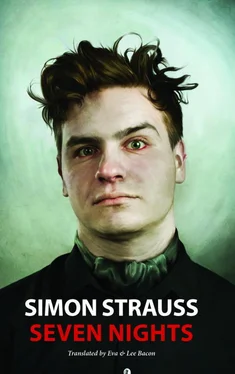But today on the sofa, time runs through my fingers. My thoughts are stuck in loops. I hear barking dogs and shouting owners. Car radios, screeching tires, fire trucks. I lie on the sofa, wishing it was the beach. “The most cruel thing about dreams is that everybody has them,” Pessoa once wrote. I can’t get this sentence out of my head.
I switch from the sofa to the armchair. Turn on the cranky old TV. It’s bitter about its status as a has-been. In the old days, people gathered around it. Regarded it as a window to the wonders of the world. The entire living room was designed around it. Tables and chairs were relocated. Shelves pulled off the wall. Carpets installed. Today, everyone carries the wonders around in their pocket. They watch the most gripping movies, the most important finals on teeny-tiny screens. I buck the trend. Push the dusty button and once more blow into the embers of the dying campfire. Somewhere someone important is giving a speech concerning the state of the nation. He addresses me with a clear voice, as if I, here on this armchair next to the foggy window, am his only listener. He is talking with a lot of energy and doesn’t use air quotes around his sentences:
Foreigners are dangerous. A danger to everyone who thinks that their life could go on endlessly like it has up to this point. Those who cannot imagine that things can fundamentally change. Who still hope that what’s in the paper has nothing to do with their cereal bowls and tennis classes.
The foreigners are our business. They will challenge us, limit us, scare us and change our minds. Many of them are sick from what they went through, got infected with the dangerous virus of memory. They, who now live among us, in our communities and cities, who shower here, eat here and cry here. They, who make mistakes and are angry, have a true fate, not simply the wrong life. They are jetsam. If we each confine ourselves to our homes, draw the curtains, keeping to ourselves, without a counterpart, things will not work out.
For a short moment the light bulb above my head flickers. As if trying to pipe up angrily. It wants to chime in that the home in and of itself is not to blame. A person without four walls is a person without hope. Those who don’t want to stay at home, who don’t occasionally crave solitude and quiet, are out of their mind. Says the lightbulb to the guy on TV. Says the lightbulb to me. And the guy keeps talking at me, and at the lightbulb.
A community only stands together if its members feel responsibility for each other. In ancient Rome, patronage was not just a means for the powerful to win elections. It also secured the existence of the poor and helpless. They subject themselves to the protection of their patrons and trust that they’ll be defended by them. Even in the oldest sources of Roman law, this alliance of the unequal is sealed with an oath: Patronus, si clienti fraudem fecerit, sacer esto. If a patron deceives their client they will be forever denounced. Banished. The mechanism of Patronage, which in our ears sounds like exploitation and humiliation, integrates newcomers and foreigners into a community. The relationship between the patron and the client is reciprocal: it includes freedom, security, rights and duties.
How did the speaker land on ancient Rome? What brings these big ideas to my small apartment? And how do they concern me? All I’m doing is lying around staring at the wall. And I’m hungry. In the fridge there’s an open yoghurt and half a bottle of eggnog. The tube of tomato paste has sat open for too long. In the cupboard there’s a bag of salted pretzels. They’re no longer crunchy, but at least the salt is still salty.
One could also say that community breeds dishonesty. If there are more than two people in a room, at least one of them is lying. Or at a minimum, not speaking as freely. Keeping quiet in the decisive moment, playing down their insecurity with a joke, trying to talk themselves out of responsibility, rather than into it. Groups are dangerous, I think, then shuffle back to my armchair. Meanwhile, the man on TV has been talking in the background all this time. As if he didn’t care whether someone was listening to him or not.
What we need is a modern system of Patronage. The Roman empire was only able to grow as fast as it did because it understood how to tie in its new citizens and control them through these ties. The territory was not managed through surveillance and punishment, but through the feeling of mutual dependency. We, too, must relearn the value of the personal relationship. It would be sufficient if every foreigner coming into our country was allocated an established resident patron. The state itself is hard to befriend. Its character is too stony. The constitution and the famed values cannot be touched, cannot be hugged. But the relationship, the promise between two people, creates trust across the borders of culture and morals.
I, for one, trust nobody. I don’t even know my neighbors. When I moved in they didn’t introduce themselves to me. And I don’t knock on other people’s doors out of principle. You can see that people want to be left alone. To their own devices and their delivery people. The secret motto of us all: “I would prefer not to.” The pretzels are gone. On the windowsill a bottle of red wine. A gift from happier days. From a woman I don’t know. On her shoulder she had a tattoo of a fern. She was accompanied by a friend from school, talked little, knew a lot. Where does she live now? Whom does she love now? City or countryside, dog or cat? Sickness, kids, frozen eggs?
Strange how the thoughts come and go. How they emerge from dust bunnies, briefly take shape and then turn into shadows again and disappear. The talkers on TV of course have to pretend that they are the masters of their thoughts. But that’s not true. In reality our thoughts are the ones ruling us. Completely.
To be a patron or a client would be a duty, not a choice. One side would be incentivized with an improved chance of acceptance and material support. The other with an alleviation from certain obligations. Such as the solidarity tax or the motor vehicle tax. A lot would be gained from citizens being given the choice: pay or form bonds and once again find a reason to organize community themselves.
The bulb flickers again, illuminating the dandruff on my pullover. Cashmere always shrinks in the wash, which is why I just let it air out in the wind on the balcony. If I use the wrong shampoo, my head sheds like a blackthorn bush. Gently I brush the dandruff off my shoulders. First the left, then the right. But just moving my head causes new flakes to fall. I should wear pullovers in lighter colors. Should always make sure to stock up on the right shampoo. Dandruff is a sign of decay and neglect. I know that. But then I think, here at home nobody can see me anyway. Here at home the flakes are just stars on a dark blue backdrop. And most of all, they are mine, so I can’t be angry at them.
The bulb twitches and burns out. Power outage. The TV screen goes black. On the walls I see unfamiliar shadows. Patterns form like a cryptograph, coming from the apartment across the street, where a young woman in an apron keeps passing from the kitchen to the dining room, repeatedly obstructing and revealing the light from the floor lamp. She’s probably serving the main course of a dinner party. The guests are still all chipper and she’s in the best mood. But not for long. In a few hours everyone will be gone and all that will remain will be the dirty oyster cutlery. Then she will be lonely as well, left with the sadness known by everyone whom time has wounded.
Once I had dinner with my nemesis. He repeatedly humiliated me, even slept with my girlfriend. He hated me. I hated him. “The enemy is our own question personified,” someone once wrote in my yearbook. So I invited my nemesis. On a winter night he came running up the stairs, wheezing, sweating from his ears, not taking off his snowy shoes. We were sitting on this very sofa, the one I had just been lying on. His big butt exactly where my head was just resting. The things furniture has to put up with sometimes! I hope its memory isn’t too good.
Читать дальше












